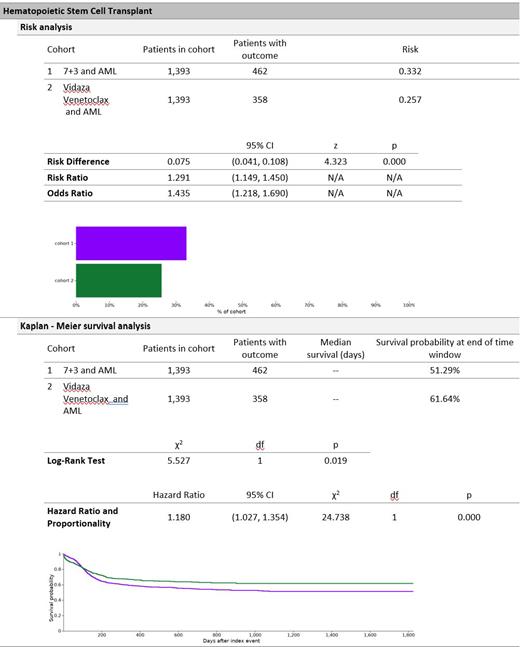Introduction:
Intensive chemotherapy(IC) with cytarabine and anthracycline (7&3) has been the backbone therapy for medically fit patients for the last 50 years. The use of Venetoclax and hypomethylating agent combination has be used in older and unfit patient populations. The Venetoclax combination regimen has improved outcomes in the selected group but has been characterized to be inferior to 7&3 regimen among some studies. The role of stem cell transplant has not been previously discussed who receive IC versus Venetoclax based chemotehrapy
Methods:
Retrospective data was extracted using the TriNetX database. The primary endpoint was overall survival, and stem cell transplant in the two cohorts.
Results:
5590 patients were identified in cohort-1 (7+3 cohort) and 2944 patients were identified in cohort-2 (Vidaza with Venetoclax cohort). Table-1 shows patient characteristics at baseline. Propensity-score-matching was used to balance the two cohorts. Patient count in each group after matching was 1393 (Table-2). Overall survival was 43.78% in cohort-1 versus 16.56 % in cohort-2, with HR of 0.510 (95% CI 0.457, 0.569) in favor of cohort 1 (Figure-1) at 5-year mark. Median OS for cohort-1 was 1055 days versus 289 days for cohort-2. Additional analysis was performed to determine number of patients who underwent a Stem Cell Transplant in each cohort and the effect of transplant on outcomes. 462 patients in cohort-1 and 358 patients in cohort-2 underwent transplant respectively. Overall survival was 51.29% in cohort-1 versus 61.64% in cohort-2, with HR of 1.180 (95% CI 1.027, 1.254) in favor of cohort-2 at 5-year mark. Median overall survival was not reached for either cohort at the data cut-off.
Conclusions:
Our retrospective analysis of a large patient cohort showed improved OS and decreased risk of death in patient's undergoing 7&3 induction therapy as compared to Vidaza with Venetoclax. In patients who underwent stem cell transplant, the overall survival was statistically better in Vidaza with Venetoclax cohort as compared to 7&3 induction therapy cohort. To the best of our knowledge, this is the first large database based study evaluating these two induction regimens accounting for stem cell transplantation.
Disclosures
No relevant conflicts of interest to declare.


This feature is available to Subscribers Only
Sign In or Create an Account Close Modal